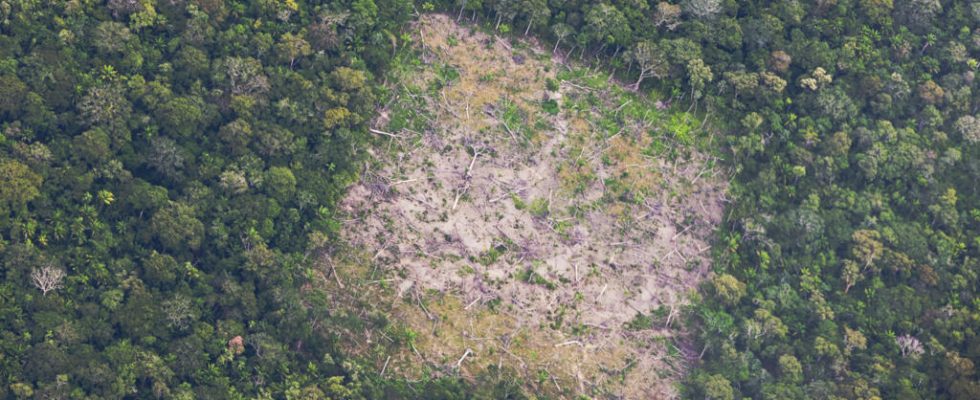In the Andean country, deforestation of primary forests increased by 27% between 2022 and 2023, where countries like Colombia or Brazil saw their forest losses decrease drastically. A difference which can be explained by the development model put in place by the Bolivian government.
4 mins
From our correspondent in La Paz,
Half a million hectares. This is the area of primary forests lost by Bolivia in 2023. A record for the third consecutive year and which places the Andean country third largest clearer of primary forests in the world, behind the DRC and the Brazil. “ Unfortunately, this is no surpriseregrets Jorge Campanini, researcher at the Documentation and Information Center of Bolivia (Cedib, independent), the government does not take measures to slow the advance of the agricultural frontier and does the minimum to prevent fires “. In 2023, more than half of Bolivia’s primary forests will be lost due to fires, estimates the NGO Global Forest Watch.
The government’s “soft hand” is not new. In Bolivia, deforestation began to explode in 2015 and has continued to increase since then. “ For the different MAS governments [parti au pouvoir, ndlr] deforestation is a way to develop the country », analyzes Cecilia Requena, senator of Comunidad Ciudadana (opposition) and specialist in environmental issues. On March 26, 2024, President Luis Arce inaugurated the country’s first biofuel plant in the Santa Cruz department. The objective is twofold: to reduce fuel imports into the country while producing a biofuel presented as more ecological. “ We should talk about agrofuel, more than biofuel, because it will be produced from soya or palm, monocultures which will cause deforestation when it is necessary to increase their production », continues the senator.
In addition to biofuel, Luis Arce’s government is banking on soy and meat exports. “ Bolivia seeks to sell its meat to the Chinese market, explains Jorge Campanini, so far these are only very large quantities [200 millions de dollars en 2023, Ndlr] but the idea is to develop this sector, although it is a vector of deforestation “.
Extractivist laws
In August 2023, during the Amazon summit in Belém (Brazil), Bolivia is identified as one of the countries having opposed the quantified objectives for reducing deforestation proposed by Brazil and Colombia. A decision that Cecilia Requena describes as “ disastrous, both for the Amazon, but also for the image of Bolivia ». These divergences clearly emerge in the evolution of deforestation in these different countries: in Brazil and in Colombialosses of primary forests decreased by 36% and 49% respectively in one year according to the World Research Institute.
Where these two countries have implemented forest conservation policies, the Bolivian public authorities are pushing for deforestation. “ We see this very clearly in the Béni department, largely in the Amazon. », explains Jorge Campanini. In 2019, the government of this department in the north of the country adopted a new land use plan which provides for the development of mechanized agriculture and therefore the use of land for this activity. “ Since then, deforestation has exploded in Béni », notes the researcher. Certain laws also favor several extractivist sectors: “ The mining law and the hydrocarbons law have made certain environmental requirements more flexible and even the prior consultation of local populations, denounces Cecilia Requena, they should be repealed to slow down deforestation”.
“ The State does not have the capacity, nor the will, to monitor the entire Amazon »
On the question of fires, the situation is slightly different. Their intensity and the devastation they caused in certain regions worried the population, forcing the government to react. “ Fire surveillance has been strengthenedexplains Jorge Campanini, but the State does not have the capacity, nor the will, to monitor the entire Amazon “. Bolivia also has several laws “ incendiaries », criticized for encouraging fires. The most notable being Law 1171 on the “use and rational management of fires” which allows the legal burning of land to make the land fertile. A practice called eacho with sometimes dramatic consequences, because many of these fires become uncontrollable. This law also penalizes eachos without authorization, the fine ranging from 33 cents to 2 euros per hectare burned.
Read alsoBolivia: Lake Titicaca on drought alert, a danger for local populations
For Senator Cécile Requena, the year 2024 should not be the year of decline in deforestation in Bolivia: “ With the policies put in place, particularly around agrofuels, I am afraid that this year will not only be similar, but worse than 2023 ». Added to this is the widespread rise in temperatures and drought in certain Bolivian regions which could encourage new fires.
► To go further: Environmental questions
